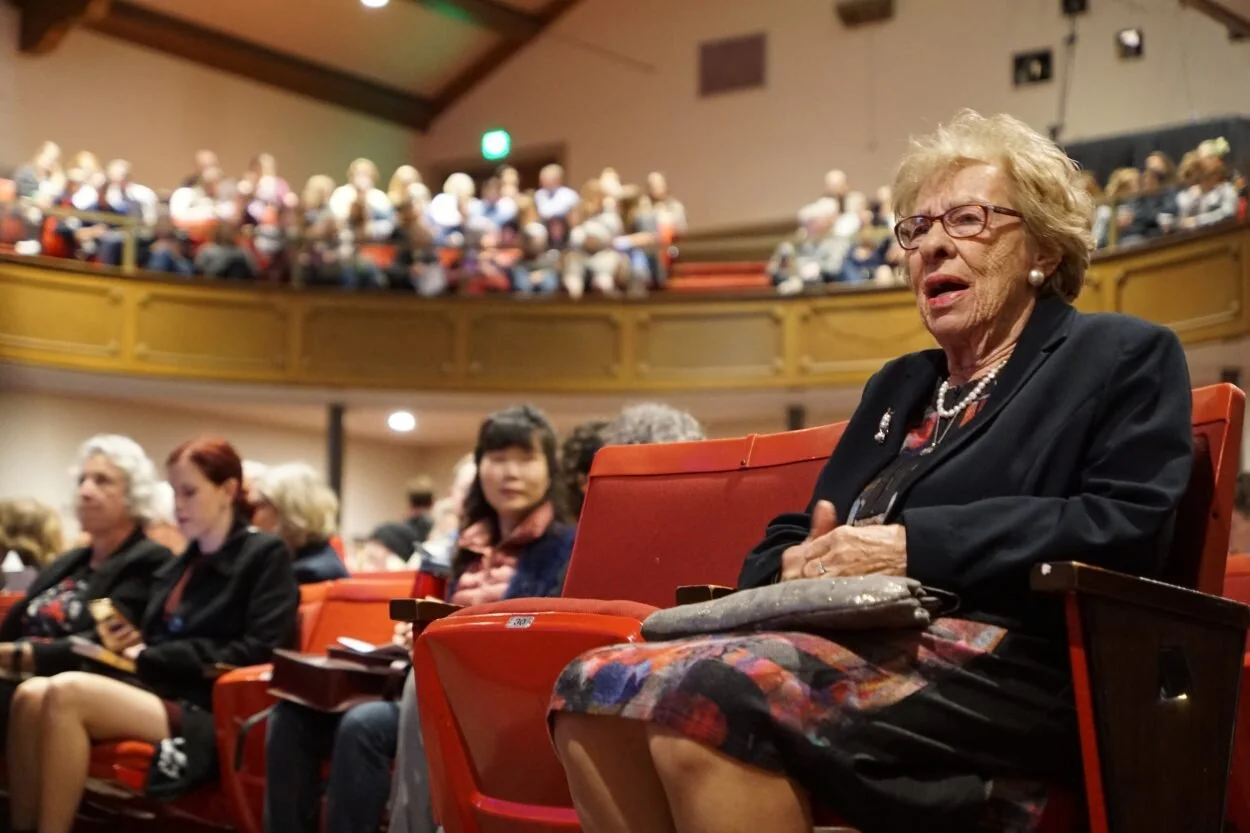Anne Frank stepsister Eva Schloss speaks at Chapman days after Newport Beach swastika incident
Days after Newport Beach high school students formed a swastika out of red cups and gave Nazi salutes, Eva Schloss spoke at Chapman. Schloss, who is a Holocaust survivor and Anne Frank’s stepsister, spoke to an audience of about 1,000. Photo by Jack Clendening
At many parties, red solo cups are a staple. They’re often used for beer pong, or to hold mixed drinks. But at a Newport Beach high school party that reportedly took place the weekend of March 1, red plastic cups formed the shape of a swastika on a table, with students extending their arms in what appeared to be a Nazi salute
Eighty-nine-year-old Eva Schloss, a Holocaust survivor and Anne Frank’s stepsister, met March 7 at Newport Beach Harbor High School with some of the students involved in the incident, a day after she spoke at Chapman.
“It’s been about 70 years, and the new generation hasn’t experienced anything like (the Holocaust),” Schloss said at Chapman. “It is important to educate the young people about the dangers of racism, prejudice and intolerance. Not everyone in Germany knew what was going on, but there were obviously cowards who didn’t speak up.”
Schloss spoke to an audience of about 1,000 in Memorial Hall on March 6.
“My biggest goal is to feel like there’s a sense of community,” said Leslie Susman, the secretary of Chabad at Chapman and event organizer for Schloss’ talk. “Because of the recent rise of anti-Semitism, from New York to Pittsburgh, to as close to home as Newport, it’s nice to bring everyone together.”
The most recent statistics from the Anti-Defamation League show that the U.S. saw a 57 percent rise in anti-Semitic acts in 2017, the largest single-year increase on record. As recently as March 7, students at the prestigious Sidwell Friends School in Washington, D.C., displayed swastikas during an assembly.
Marilyn Harran, the director of the Rodgers Center of Holocaust Education at Chapman, told The Panther that hearing someone’s voice break when they talk about something that happened to them years ago sheds light on why the Jewish community reacts so strongly to imagery like cups lined up in the shape of a swastika.
“Those who did that did not have an understanding of ideology behind the swastika and the enormous suffering and death that it perpetrated,” Harran said.
Schloss, who fled to the Netherlands in 1938 after Austria was annexed by Germany, met a little girl, no more than a month apart from her in age, who lived across the street. The two would often play hopscotch together.
That girl was German-born Jew Anne Frank, known for the diary that detailed her life in hiding from the Nazis from 1942 to 1944. She became Schloss’ best friend and playmate. At the end of World War II, Anne Frank’s father, Otto Frank, was the only one from her family to survive. Otto Frank would later marry Schloss’s mother, Elfriede, the only surviving family member in Schloss’s family besides Eva Schloss herself.
As the granddaughter of Holocaust survivors, Susman said that her aim is to better educate students in light of the recent anti-Semitic events across the country and preserve part of history that, to her, should be unforgettable.
“It was an honor to coordinate this event because we are the future, the ones who are going to pass down these stories, make sure they’re never forgotten and that something like this never happens again,” Susman said.
But Jeffrey Koerber, a professor who teaches Holocaust history at Chapman, told The Panther that groups today are still “targeted” and “demonized.”
“The kind of world that Anne Frank and Eva Schloss came from is not that different from our own.” Koerber said. “Some of the things that led to the Holocaust in Europe could potentially happen here.”
Holocaust survivors are slowly dwindling, Koerber said, and hearing a survivor’s story secondhand isn’t the same.
“It’s not going to be very much longer that we have this opportunity to be able to hear survivors speak about their experiences. Koerber said that “the last generation that experienced this who were children at the time won’t be with us much longer.”

